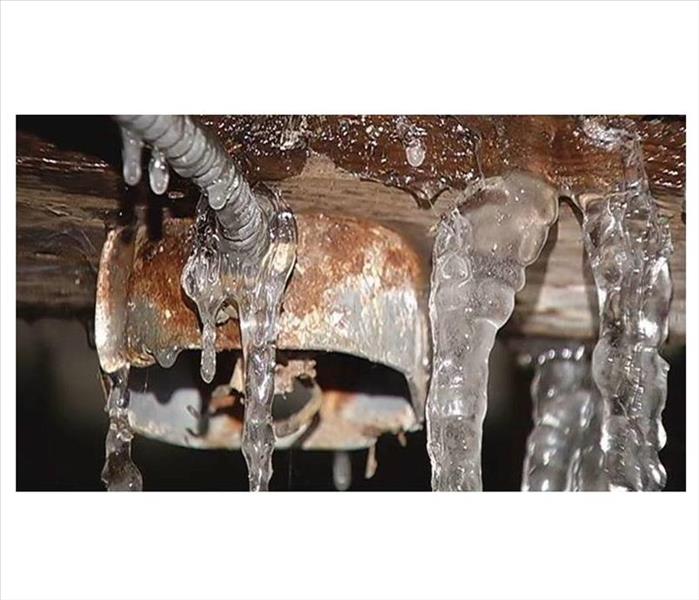How to Prevent Frozen Pipes and What to Do if They Freeze Anyway
10/15/2019 (Permalink)
Brrrr it’s cold in here! There might be some frozen pipes in your house this year! Frigid winter temperatures can cause pipes to freeze – or even burst. Do you know how to tell if pipes are frozen? Here are some tips to help prevent frozen pipes and a list of suggestions for you to follow if they do freeze.
SYMPTOMS of Frozen Pipes
One of the earliest signs of a frozen pipe is when no water comes out of your faucet when you turn it on. If you notice that, head first to the basement and check to see that the water is still turned on and that you don’t have a leak. Once you’ve confirmed these two things, continue your inspection to make sure one of your pipes has not burst.
If your search reveals that your pipes are frozen but none have ruptured, you have two choices:
- Call a plumber to help thaw your frozen pipes. This is a good idea if you don’t think you can safely thaw the pipes yourself, you don’t know where the frozen pipes are or you can’t access the frozen area.
- Attempt to thaw the frozen pipes yourself. Be aware this option can be dangerous if not done correctly.
How to FIX Frozen Pipes
If you attempt to thaw the frozen pipes yourself, keep the following tips in mind:
- Keep your faucet open. Water and steam will be created during the thawing process, and your pipes need an opening to discharge this. Keeping the faucet open also allows for moving water to run through the pipe, which will expedite the thawing process.
- Apply heat to the section of the pipe that is frozen. This can be done by wrapping an electronic heating pad around the pipe, heating the area with a hair dryer or both. If you lack either of these items, using towels soaked in hot water will help as well.
- Know what not to do. Never use a blowtorch, propane or kerosene heaters, a charcoal stove or any other open flame device to thaw your frozen pipes. You should also avoid using a space heater unless you are sure the area is clear of any flammable material.
- Continue applying heat until water flow returns to normal. Once you have successfully thawed the pipe, turn on other faucets in your home to check for any more frozen water pipes.
- Take swift action if the frozen pipes are located inside an exterior wall. Cut a hole in the wall toward the inside of the house to expose those pipes to warmer air.
How to PREVENT Frozen Pipes
While we can’t control the weather, there are things we can do to prevent pipes from freezing. To prevent pipes from freezing and causing major damage, follow these steps:
- Drain water from pipes that are likely to freeze. This includes your swimming pool and sprinkler water supply lines.
- Disconnect any hoses from the outside of your home, drain the hoses and store them in the garage. Make sure to close the indoor valves supplying these outdoor access points.
- Insulate the area around vents and light fixtures. This helps prevent heat from escaping into the attic.
- Seal any wall cracks. Be sure to pay careful attention to the areas around utility service lines.
- Open kitchen cabinets. This allows the warm air to circulate around the pipes.
- Keep the garage doors closed to protect water lines.
- Allow your faucets to drip cold water on the coldest days. The movement will make it harder for the water to freeze.
- Keep your thermostat at the same temperature day and night. Never let it fall below 55 degrees Fahrenheit when you leave your home.
- Ensure you have proper seals on all doors and windows.
- Place a 60-watt bulb in areas where you’re concerned about pipes freezing. Make sure there are no combustible materials near the bulb.
Call SERVPRO of Easton, Bethlehem & Whitehall if you experience frozen pipes this winter season! 800-455-9453





 24/7 Emergency Service
24/7 Emergency Service
